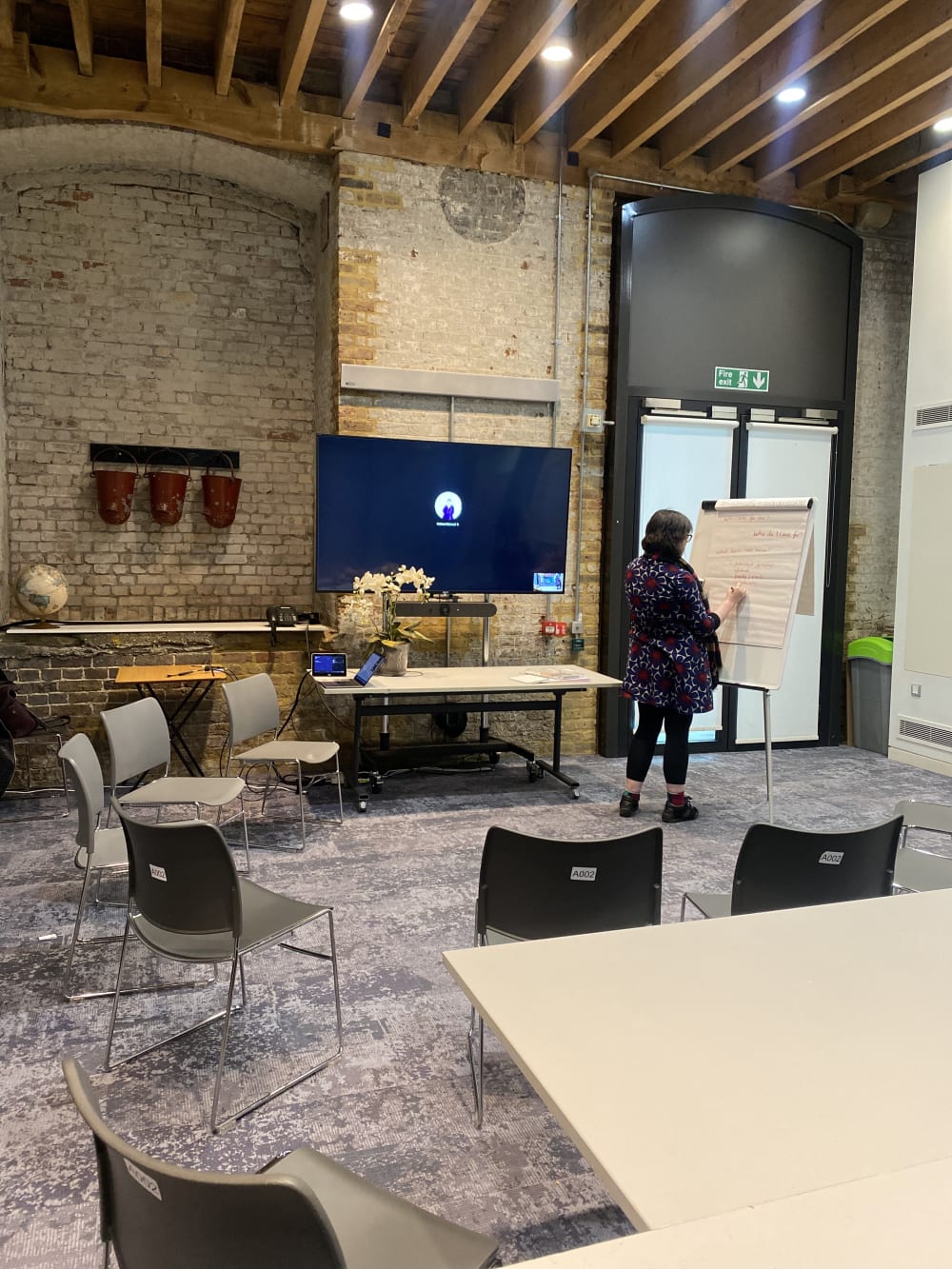
Who Cares? A Wellbeing Workshop
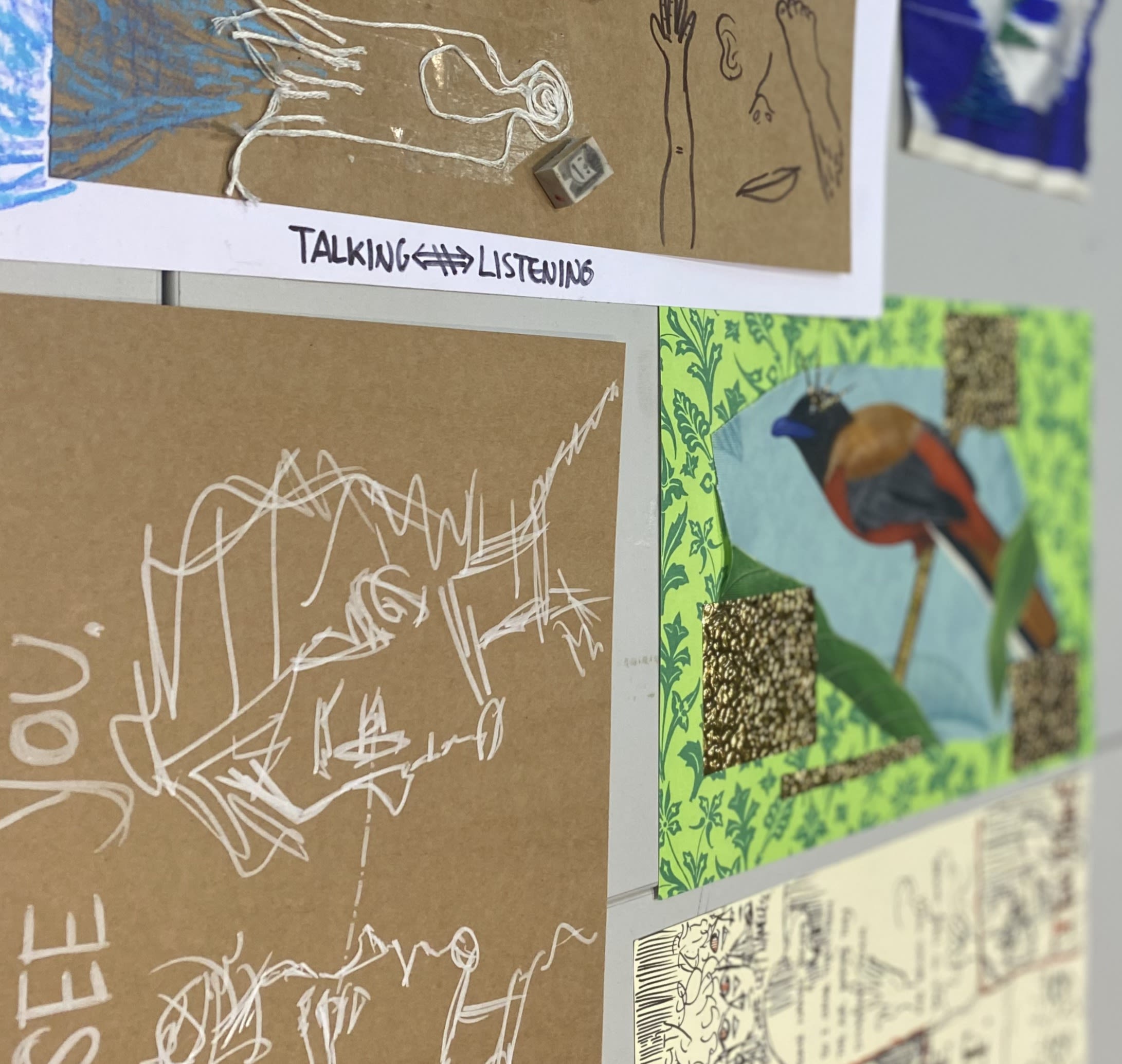
- Written bySarah Dixon
- Published date 28 March 2024

To mark University Mental Health Day, Post-Grad Community held a workshop facilitated by SURGE III artist Sarah Dixon (MA Performance: Society, Central Saint Martins, UAL). At the workshop, postgraduate students, alumni and staff came together to explore the topic of “care”.
Introduction
Everyone is cared for at some point in life, from birth onwards through growth, learning, health challenges, incapacity whether temporary or permanent, illness and end of life. Caring is a foundational part of human life and is not always seen or acknowledged. We may be scared or ashamed to seek care when we need it, we might resent giving it, we might just run out of capacity to care. These are collective questions and have significant implications for mental health. The creation of care can be light, simple, deep or complex. It can be fun, enriching, boring, or burdensome. It can be physical, emotional, social, spiritual and cultural.
Looking at the idea of care together we will explore how we might access and ask for care better in our own lives and through social means.
Sarah Dixon is an artist and coach, studying MA Performance: Society and working in socially engaged practice in relation to pregnancy, childhood, and EDI.

Participation
We had approx 20 participants with a range of student, alumni and staff. Several people had to cancel at the last minute (some due to caring responsibilities) and Catriona (Post-Grad Community Liaison Coordinator) set up a Teams option so they could listen in via the large screen in the room. About 3-4 people took part in this way.
Some participants in person came in late or left early, creating a sense of fluidity and an overlapping experience.
I was asked several times if this workshop would run again, partly due to participants who couldn’t attend the whole session or had to cancel.
Process
Seated in a half-circle, we began with orientation and a simple breath exercise to come into the space attentively.
We then took a round where each person could introduce themselves, their name and position in UAL, and sharing some thoughts about care and what had attracted them to the session.
Topics touched upon included loneliness, distance from family (being a self-protection or being a difficulty to “care from afar”), care for elders, institutional care and how that might be improved, whether self care was selfish, the tension between caring for oneself and caring for others, the question of whether others received care in the way we intended, the reciprocal care between a loved pet and the owner, managing one’s own nervous system, and perceptions of moral attributes around being a “caring person”.
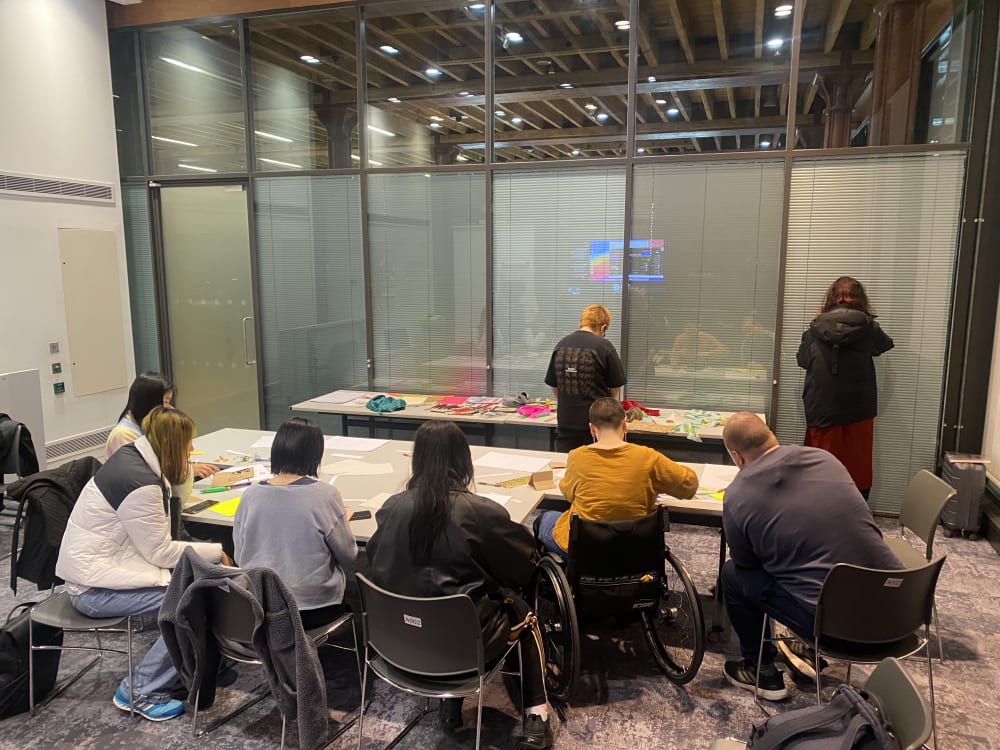
Then the group was offered an exercise in co-listening, using active listening as a tool. Most of the group had not come across this practice before. The group formed pairs and threes.
In pairs, each person was offered 5 minutes to talk, while their partner simply listened. Then after 5 minutes they could swap roles.
Active listening means paying attention and showing engagement by gestures such as nodding or eye contact, whilst avoiding making comments, interruption, advice or verbal responses.It is not absolute - it can be appropriate to make simple reflective replies like, “oh yes”. The groups of 3 had 3 minutes per person and two people listening.
The reflections from this practice were that it sometimes felt uncomfortable - either to be the “talker” or the listener: thoughts like “am i boring them?” “how can I show I am listening?” “is this entertaining enough?” “I don’t know what to say” might come up and this is not a “normal” way of interacting so it felt strange.
There was also reflection that it felt good to be able to speak continuously without feeling that one was interrupting or taking too much space. And recognising that listening is a form of communication as well as talking.
One participant shared that they had started to question a lot about how they cared for others, and was feeling confusion. I offered a suggestion that they focus on what feels like care to them, with the idea of grounding oneself in one’s own safety and sense of care in order to explore the questioning that had come up. We did this as a group in the creative exercise (see below)
Collective sharing
We then used postit notes to create a board of thoughts and ideas, linked with the prompts.
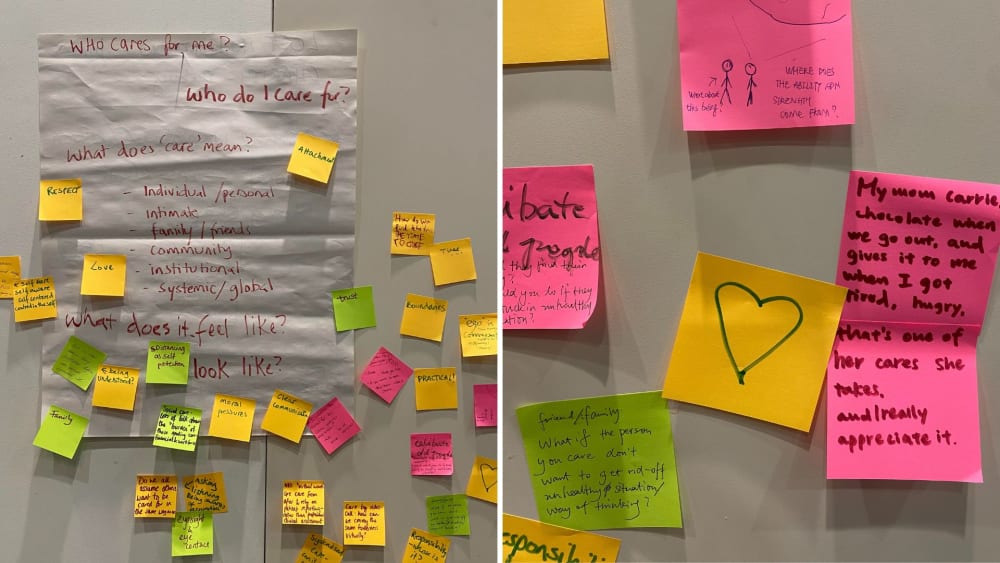
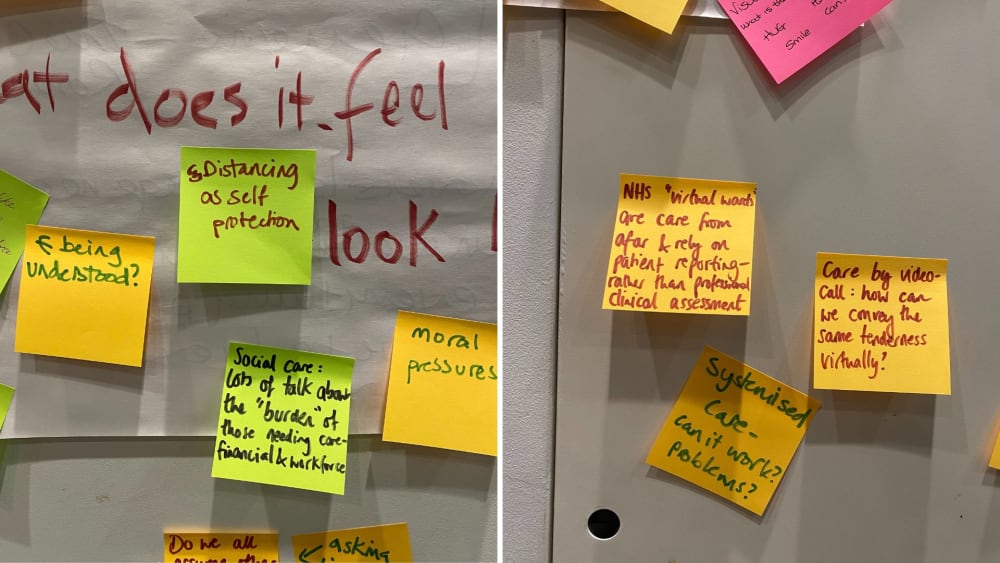
Creative Time
We then allowed for a break and a few people headed out at this time. The materials including magazine, scrap paper, drawing materials and textiles were offered for use in creating or writing as a way of integrating and deepening into the feelings around care and caring.
Small works were made including sculptural, embroidered, graphic novel/comic, collage, writing and drawing techniques. These creations offered participants new insights, feelings of meditation and shared interests or themes such as erasure - how we choose what to erase from ourselves, what is erased inter-culturally, when we need to erase something in order to create clarity, when we are compelled to erase something in ourselves as a sacrifice for others. We also shared some poetic moments through conversation and sharing the meanings of names and what names can mean to us.
Reflections on the making included ideas around being seen; being safe or sheltered/protected; managing intense emotional states; creating an installation to communicate and share experiences; the meditative and soothing quality of the making process; and how good it felt to be playful and step outside of usual expectations and habits of making. There was also the idea of making a gift as an expression of gratitude, that goes further than words of thanks, and how that could also be a positive process in the making.
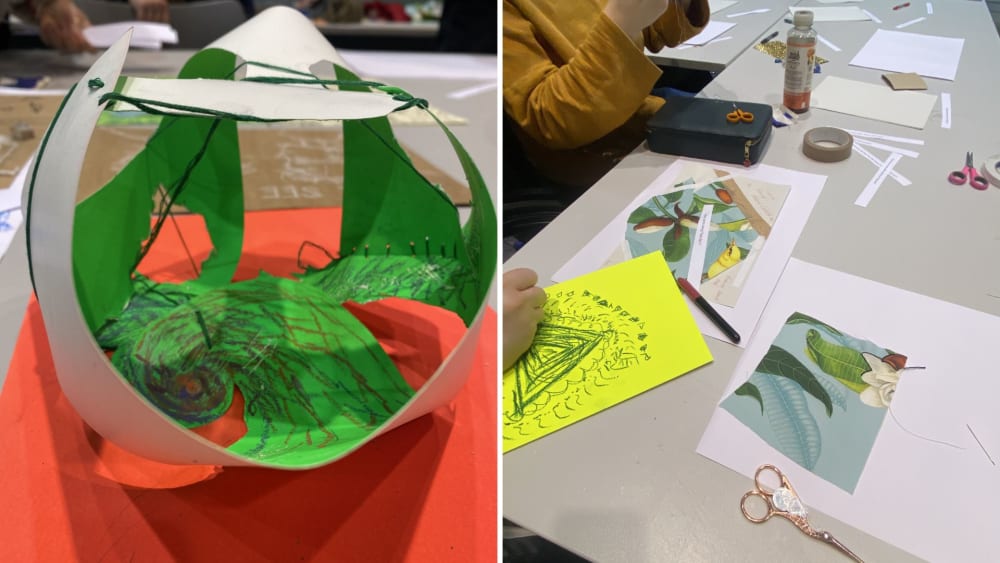
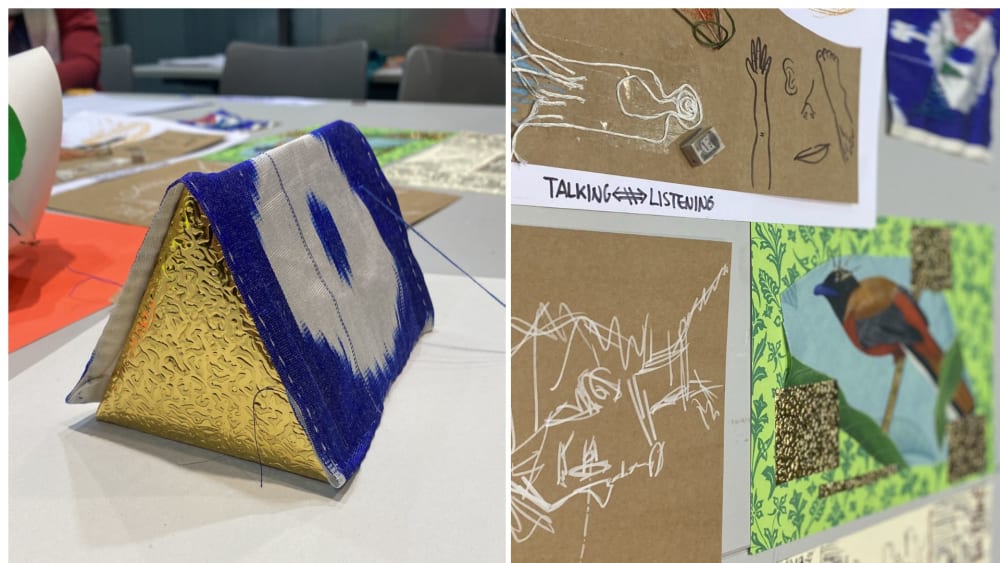
Takeaways
We finished off with sharing what we were taking away with us. These included continuing to explore how to prepare for a new study program, wanting to continue practising co-listening/active listening, discovering confidence and courage through a new practice, making a connection between the making and one’s own internal experiences, and wanting to continue creating spaces for the self to be playful and free in making.
With many thanks to Catriona Mahmoud and the Post-Grad Community team at UAL for the support in bringing the session. And to all the participants in person and remote, for generously contributions and participation.
Relevant Links
- Find out more about Sarah Dixon
- Discover Sarah's work in the SURGE III exhibition
- Visit the SURGE III exhibition, taking place until 10 April 2024
- Follow Post-Grad Community on Instagram
Post-Grad Community Stories
Stories is a thriving online platform of postgraduate voices. Here you can share thought-provoking experiences, practices, thoughts and articles about what matters to you.
Download the PDF Guide to writing articles for Post-Grad Stories.
Post-Grad Community
Established in 2013, Post-Grad Community is an inclusive platform for all UAL postgraduate students to share work, find opportunities and connect with other creatives within the UAL and beyond. Find out more.